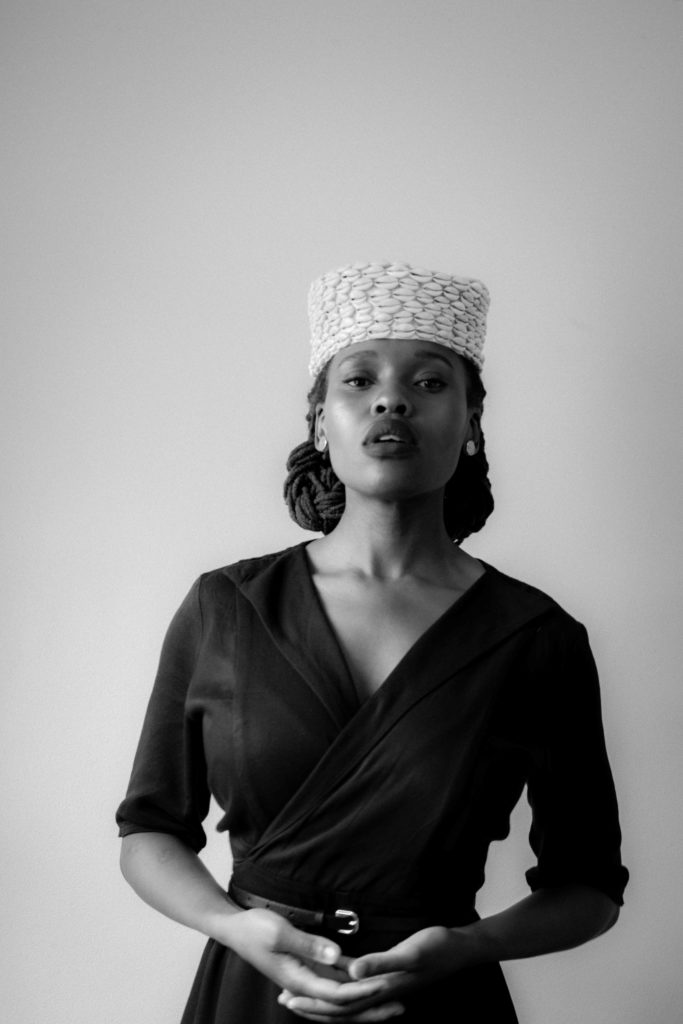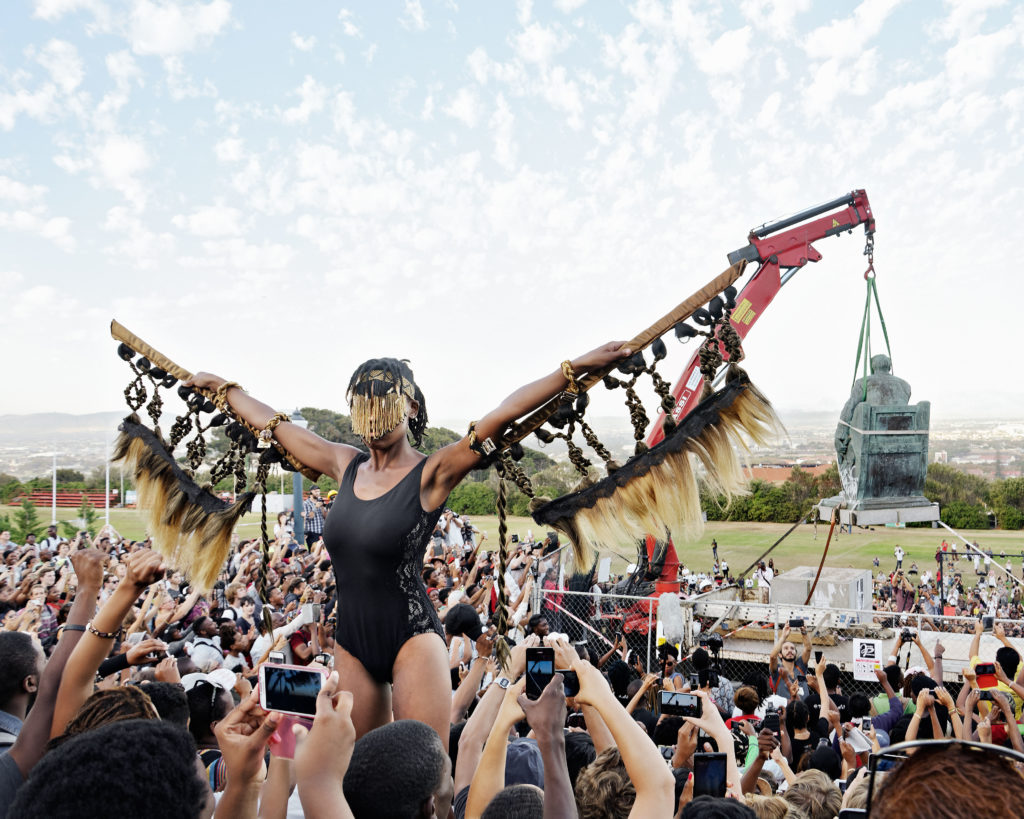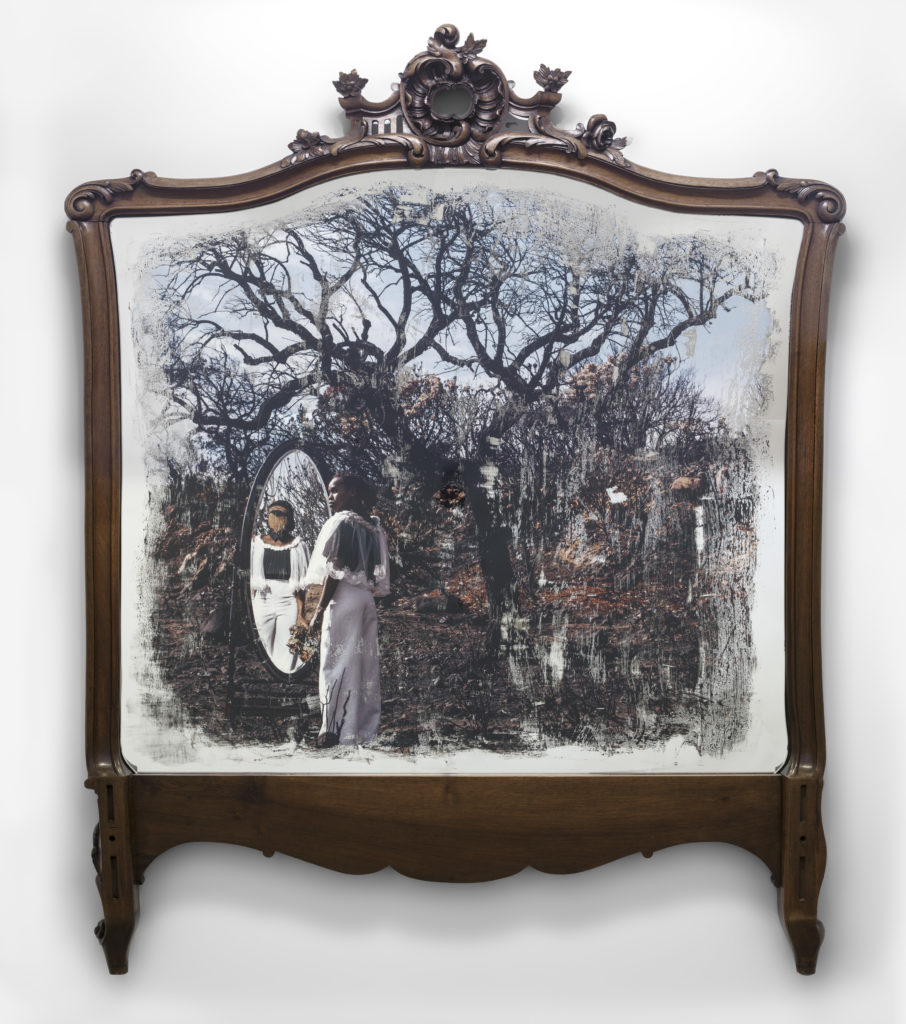
Sethembile Msezane was born in 1991 in KwaZulu Natal, South Africa. She lives and works in Cape Town, South Africa. She was awarded a Masters in Fine Arts in 2017 from the Michaelis School of Fine Art, University of Cape Town, where she also completed her Bachelor of Fine Arts in 2012. Using interdisciplinary practice encompassing performance, photography, film, sculpture and drawing, Msezane creates commanding works heavy with spiritual and political symbolism.
The artist explores issues around spirituality, commemoration and African knowledge systems. She processes her dreams as a medium through a lens of the plurality of existence across space and time, asking questions about the remembrance of ancestry. Part of her work has examined the processes of mythmaking which are used to construct history, calling attention to the absence of the black female body in both the narratives and physical spaces of historical commemoration.
Msezane is a recipient for the Best Visual Art in the Humanities and Social Sciences (HSS) Award for the National Institute for the Humanities and Social Sciences (2020). She is an OkayAfrica 100 women 2018 Honoree. Msezane was a TEDGlobal Speaker in Ausha, Tanzania (2017). She was a TAF & Sylt Emerging Artist Residency Award winner (TASA) (2016). Msezane is the first recipient of the Rising Light award at the Mbokodo Awards (2016). She is a Barclays L’Atelier Top 10 Finalist (2016). She is a Sasol New Signatures Merit Award winner (2015).
Msezane’s work has been widely exhibited across South Africa and internationally. It was included in All Things Being Equal…, the inaugural exhibition of the Zeitz MOCAA in Cape Town, and forms part of the museum’s collection, as well as that of the Iziko South African National Gallery in Cape Town, and the University of South Africa (UNISA), in Johannesburg. In 2015, during protests by the Rhodes Must Fall Movement, she presented the performance Chapungu – The Day Rhodes Fell at the removal of the Cecil John Rhodes statue at the University of Cape Town.
Sethembile Msezane est né en 1991 dans le KwaZulu Natal, en Afrique du Sud. Elle vit et travaille au Cap, en Afrique du Sud. Elle a obtenu une maîtrise en beaux-arts en 2017 à la Michaelis School of Fine Art de l’Université du Cap, où elle a également obtenu une licence en beaux-arts en 2012. Utilisant une pratique interdisciplinaire englobant la performance, la photographie, le film, la sculpture et le dessin, Sethembile Msezane crée des œuvres imposantes, lourdes de symbolisme spirituel et politique.
L’artiste explore les questions relatives à la spiritualité, à la commémoration et aux systèmes de connaissance africains. Elle traite ses rêves comme un moyen d’expression sous le prisme de la pluralité de l’existence, notamment à travers l’espace et le temps. Elle pose des questions sur le souvenir de l’ascendance. Une partie de son travail a examiné les processus de création de mythes qui sont utilisés pour construire l’histoire, en attirant l’attention sur l’absence du corps féminin noir dans les récits et les espaces physiques de la commémoration historique.
Sethembile Msezane a reçu le prix du Best Visual Art en sciences humaines et sociales de l’Institut national des sciences humaines et sociales (2020). Elle est lauréate du prix “OkayAfrica 100 women 2018 Honoree”. Sethembile Msezane a été conférencière de TEDGlobal à Ausha, en Tanzanie (2017). Elle a été lauréate du TAF & Sylt Emerging Artist Residency Award (TASA) (2016). Sethembile Msezane est également la première lauréate du prix Rising Light aux Mbokodo Awards (2016); finaliste du Top 10 de Barclays L’Atelier (2016) et lauréate du prix Sasol New Signatures Merit Award (2015).
Le travail de Sethembile Msezane a été largement exposé en Afrique du Sud et dans le monde. Elle a été incluse dans All Things Being Equal…, l’exposition inaugurale du Zeitz MOCAA au Cap, et fait partie de la collection du musée, ainsi que de celle de la Iziko South African National Gallery au Cap, et de l’Université d’Afrique du Sud (UNISA), à Johannesburg. En 2015, lors des manifestations du Rhodes Must Fall Movement, elle a présenté la performance Chapungu – The Day Rhodes Fell lors du retrait de la statue de Cecil John Rhodes à l’Université du Cap.


